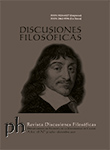Autores/as
Resumen
Este artículo aclara la relación entre Al-Ghazali y René Descartes, para articular similitudes y diferencias en sus respectivos periplos desde la duda a la certidumbre. Algunos investigadores concuerdan en que los argumentos de la duda que emplean Descartes y AlGhazali son similares, pero identifi can sus caminos desde la duda como radicalmente diferentes: mientras Descartes encontró la superación de la duda mediante el cogito o la razón, Al-Ghazali fi nalizó su Aventura fi losófi ca como un Sufi , abrumado por su experiencia místico-religiosa. Este artículo demuestra lo contrario. Bajo un cuidadoso escrutinio textual y aprovechando algunos conceptos fenomenológicos básicos de Husserl, planteo que la posición de AlGhazali fue malinterpretada, y así revelo su verdadera naturaleza filosófica.
Palabras clave
Citas
Alfalahi, A. Naqd Al-aql bayna Al-Ghazali wa Kant (Critique of Reason between Al-Ghazali and Kant). Beirut: Almo’assa Algame’eyya ledderasat, 2003.
Al-Ghazali. Al-Mustasfa min ‘ilm al-isul. Translated by Hammad, Ahmad Zaki, unpublished PhD dissertation. The University of Chicago, 1987.
---. Revival of Religious Sciences(Ihya’ Ulum Aldin). Cairo, Egypt: Al-Ahram Center for Translation and Publication, 1988.
---. Moderation in Belief (Al-Iqtisad fi Al-I’Tiqad). Translated by Aladdin M. Yaqoub. Chicago: University of Chicago Press, 2003.
---. Deliverance from Error (Al-Munqith min al-Dalal). Translated by Richard Joseph McCarthy. Louisville: Fons Vitae, 2006 (original work published 1116).
Al-Kaa'k, O. Al-Ahram daily newspaper, Egypt, 30-7-1976.
Al-Najjar, A. Viewpoints on Al-Ghazali’s Thought (Natharat fi fikr AlGhazali). Cairo, Egypt: Dar Al-Ma’aref, 1992.
Bernet, R., Kern, I. and E. Marbach. An Introduction to Husserlian Phenomenology. Evanston: Northwestern University Press, 1993.
Descartes, R. The Philosophical Writings of Descartes. Translated by John Cottingham, Robert Stoothoff, and Dugald Murdoch, 2 volumes.
Cambridge: Cambridge University Press, 1999.
Doney, W. “The Cartesian Circle.” Journal of the History of Ideas. 1955: 324-338.
Esposito, J. L. Oxford Dictionary of Islam. New York: Oxford University Press, 2003
Husserl, E. The Idea of Phenomenology. Translated by Lee Hardy. Dordrecht: Kluwer Academic Publishers, 1999.
Menn, S. “The Discourse on the Method and the Tradition of Intellectual Autobiography,” Miller, J. and B. Inwood (Eds.). Hellenistic and Early Modern Philosophy. Cambridge: Cambridge University Press, 2003.
Moad, O. E. “Comparing Phases of Skepticism in Al-Ghazali and Descartes: Some First Meditations on Deliverance from Error.” Philosophy East and West. 2009: 88-101.
Moghniya, M. J. Ma’alem Al-falsafa Al-Islamiya (Characteristics of Islamic Philosophy). Beirut, Lebanon: Al-Hilal Publishing House, 1973.
Najm, S. M. “The Place and Function of Doubt in the Philosophies of Descartes and Al-GGhazāl.” Philosophy East and West. 1966: 133-141.
Naumkin, V. V. “Some Problems Related to the Study of Works by AlGhazzali.” Ghazzali: La Raison et le Miracle, Paris: UNESCO, 1987.
Rose, L. E. “The Cartesian Circle.” Philosophy and Phenomenological Research. 1965: 80-81.
Sharif, M. M. “Influence of Muslim Though on the West.” Sharif, M. M.
(Ed.). A History of Muslim Philosophy. Wiesbaden: Otto Harrasowitz, 1963.
Wilson, C. “Modern Western Philosophy,” Nasr, S. H. and O. Leaman (Eds.). History of Islamic Philosophy, part 2. London: Routledge, 1996.

 pdf
pdf
 FLIP
FLIP


























